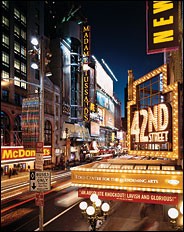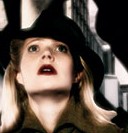Wednesday, March 31, 2004
Life
The Military Industrial Porn Complex
Popular science magazines used to be aimed at the geeky wannabe inventor. Today, it's all about the glamour of war.
Simply Simpson
Why pop songwriting's not what it used to be.
Expressions
Tuesday, March 30, 2004
World
Face The Fetus
It's time for abortion rights advocates to stop denying reality.
At The Center Of The Storm Over Bush And Science
To a degree not seen in previous administrations, a wide range of influential scientists express dismay at White House science policy.
Life
The Height Gap
Why Europeans are getting taller and taller — and Americans aren't.
Expressions
Monday, March 29, 2004
Life
Abridged Too Far
 I went to the library to get my daughter "The Wind in the Willows." What I found was a happy-face, Disney-esque conspiracy to rob the classics of children's lit of their drama, their passion and their soul.
I went to the library to get my daughter "The Wind in the Willows." What I found was a happy-face, Disney-esque conspiracy to rob the classics of children's lit of their drama, their passion and their soul.
News Reports For Ultra-Short Attentions
Shepard Smith, the host of Fox News Channel's "Fox Report," regularly pulls in around 1.5 million viewers. Part of his technique is to edit out verbs.
Sunday, March 28, 2004
World
Dictatorship.com
While it's true that the Internet has proved itself able to disseminate pop culture in authoritarian nations, its political impact has been decidedly limited.
Life
Repair Man
Mahmood Rezaei-Kamalabad doesn't just fix cars at his Cambridge service center, he also maintains a mystical machine designed to soothe your soul.
It's Brash, It's British, It's Not PBS
From music to fashion to politics, British and American cultures crisscross faster than ever today. In the six years since it began, the American offshoot of the BBC has shrewdly exploited those crosscurrents.
Heart Of Darkness That Was Rwanda
 A decade after the massacre, new films revisit the horror.
A decade after the massacre, new films revisit the horror.
The Human Factor
 Should the government put a price on your life?
Should the government put a price on your life?
Swan Song
 When I found out that La Cote Basque was closing its doors, I was sad — irrationally so, since it later occured to me that I hadn't actually eaten there in almost 14 years.
When I found out that La Cote Basque was closing its doors, I was sad — irrationally so, since it later occured to me that I hadn't actually eaten there in almost 14 years.
All Over The Maps
Oversize city maps, laminated maps, origami fold-out maps, variegated-highway maps, historical maps, topographic maps, where-the-stars-live maps — all feed my peculiar and unquenchable thirst to ascertain precisely where things are, and how to get there with the least physical exertion.
In Obscurity, The Tallest And Oldest New Yorker
There is a tulip tree that towers in relative obscurity in Alley Pond Park in northeast Queens. Tree experts call it the Queens Giant and say that, at 134 feet tall and as much as 450 years old, it is the tallest and oldest living thing in New York City.
Saturday, March 27, 2004
Life
At 100, A Magazine Has Blossomed Into A National Treasure
Publishing is a ferocious business nad most magazines don't survive five years, never mind 100. Boston-based Horticulture magazine, the country's oldest gardening magazine, has reached that landmark.
Friday, March 26, 2004
EOF
Jon Stewart Going Nowhere (Thank God)
Nobody needed to see Stewart's face flash in Times Square to prove he's a big star. So let's not underestimate this: Comedy Central pulled off one of the most astonishing business deals in its short life last week.
Thursday, March 25, 2004
Tech & Science
The Science Behind The Film Eternal Sunshine Of The Spotless Mind
If a pill could eliminate bad memories, should you actually use it?
Life
The Last Supper
Last-meal requests were always released to the media exactly the way the state received them. But many of the meals that prisoners wanted were replaced with less expensive or more accessible alternatives, which forced me to be creative in honoring prisoners' wishes.
EOF
Pointing Fingers Back At Trump, For Fun
The tourists position themselves in front of Trump Tower. They strike a pose that, to the uninitiated, might seem an awkward gesture. They extend one hand, sideways, and scream, "You're fired!"
Wednesday, March 24, 2004
Life
The Churn
Creative destruction in a border town.
Too Much Rock Ruins The Soup
After a decade in which the central presence of music in the dining room has seemed to increase steadily, could it be that restaurants are finally turning down the volume?
The Essential Egg
![]() Delivered in aningenious package, it's simply the world's most perfect food.
Delivered in aningenious package, it's simply the world's most perfect food.
A Chinese Girl's Diary Builds A Bridge Out Of Rural Poverty
The long road that brought Ma Yan to the Paris book fair this week began three years ago in the remote village of Zhang Jia Shu in Ningxia region of northern China.
Expressions
EOF
California, Ho!
Once parochial, The New Yorker has discovered that more people read its pages on the west coast.
Tuesday, March 23, 2004
Life
What's The Magic Word In Book Sales? 'Clinton'
 Out of the White House for more than three years, Bill Clinton and his wife, Sen. Hillary Rodham Clinton of New York, still generate great bookbuzz.
Out of the White House for more than three years, Bill Clinton and his wife, Sen. Hillary Rodham Clinton of New York, still generate great bookbuzz.
After Disaster, A Design For Living
Of course there's a place for grandiose memorials; but let's not forget that in the aftermath of catastrophe there is also room for the common place. The real monument to the Great Fire of London is not a column with a flaming urn on top. It is London itself. In 300 years, I hope that New York, in talking of 9/11, will be able to say the same.
Of Drunken Elephans, Tipsy Fish And Scotch With A Twist
A small group of scientists has begun to explore the idea that the explanation for humanity's love of drink lies deep in the evolutionary past.
A Little Start-Up Entertains, One Story At A Time
At a time when literary writing seems like a dying art, when little magazines are folding left and right, when publishers bemoan the sinking bottom line, here lies a spot of hope.
Monday, March 22, 2004
Tech & Science
Do We Really Use Only 10 Percent Of Our Brains?
Like so many uplifting myths that are too good to be true, the truth of the matter seems to be its least important aspect.
Life
When A Dissertation Makes A Difference
 As a graduate student at the University of Wisconsin, Devah Pager studied the difficulties of former prisoners trying to find work and, in the process, came up with a disturbing finding: it is easier for a white person with a felony conviction to get a job than for a black person whose record is clean.
As a graduate student at the University of Wisconsin, Devah Pager studied the difficulties of former prisoners trying to find work and, in the process, came up with a disturbing finding: it is easier for a white person with a felony conviction to get a job than for a black person whose record is clean.
Sounds Of Silence: First, Your Water Was Filtered. Now It's Your Life.
Given the uncertainty of terrorism and war, perhaps it's not surprising that people might look for ways to get away from it all. But is filtering the latest form of denial, the latest protective bubble we have blown for ourselves, or are we just becoming better editors of our life experience?
Sunday, March 21, 2004
Life
The Art Of Parking
 The Zip Tower, which resembles a giant Pez dispenser, is Keith Moskow's latest award-winning entry. The proposed 51-foot-high mechanical parking garage would hold seven cars and combine old technology — hydraulic cranes that would raise and lower cars — with Zipcar, the Internet-driven car-sharing service.
The Zip Tower, which resembles a giant Pez dispenser, is Keith Moskow's latest award-winning entry. The proposed 51-foot-high mechanical parking garage would hold seven cars and combine old technology — hydraulic cranes that would raise and lower cars — with Zipcar, the Internet-driven car-sharing service.
Get Out Of My Namespace
![]() The world is running out of names. The roster of possible names seems almost infinite, but the demand is even greater. With the rise of instantaneious communication, business spreading across the globe and the Internet annihilating geography, conflict is rampant in this realm of language and of intellecutal property. Rules are up for grabs. Laws regarding names have never been in such disarray.
The world is running out of names. The roster of possible names seems almost infinite, but the demand is even greater. With the rise of instantaneious communication, business spreading across the globe and the Internet annihilating geography, conflict is rampant in this realm of language and of intellecutal property. Rules are up for grabs. Laws regarding names have never been in such disarray.
Cruising The New Yangtze
 Before long, this remote region will resemble other parts of contemporary China. But for now, it is a place of arresting and captivating contrasts. In a mere decade, the very old is being elbowed out by the very new in perhaps the most rapid modernization of a people in history. You can see it all from the deck of the luxurous ships that cruise the Yangtze. If you're willing to get your fingernails dirty, you can also touch, hear and smell it in villages and cities along the way.
Before long, this remote region will resemble other parts of contemporary China. But for now, it is a place of arresting and captivating contrasts. In a mere decade, the very old is being elbowed out by the very new in perhaps the most rapid modernization of a people in history. You can see it all from the deck of the luxurous ships that cruise the Yangtze. If you're willing to get your fingernails dirty, you can also touch, hear and smell it in villages and cities along the way.
Saturday, March 20, 2004
World
Hiding Behind The Constitution
Politicians of both parties have avoided the main issue and sought refuge in the abstractions of the Constitution. Instead of asking what kind of society we want, they argue about what our structure of government can permit.
Life
The Economics Of Faking Orgasm
No, really.
Friday, March 19, 2004
Life
Who Needs An Agent? You Do!
The real question is not why would anyone want an agent, but how could you expect to reach a broad audience without one?
Thursday, March 18, 2004
Tech & Science
The Game's The Thing
Why are Hollywood actors starring on your PlayStation?
Wednesday, March 17, 2004
Life
It's A Guy Thing
 Memo to guys: Any poor schlub can take a woman to a swanky restaurant and slap down his credit card. If you really want to impress a woman, you should cook for her.
Memo to guys: Any poor schlub can take a woman to a swanky restaurant and slap down his credit card. If you really want to impress a woman, you should cook for her.
Cooking For One Discerning Diner: Yourself
 Company is sa great excuse to cook, but it's not the only one.
Company is sa great excuse to cook, but it's not the only one.
For The Ultimate Control Freak: Cook-It-Yourself
 "Cook-it-yourself restaurants"? Boy, talk about an oxymoron — with the accent on the last two syllables.
"Cook-it-yourself restaurants"? Boy, talk about an oxymoron — with the accent on the last two syllables.
Poe's Tortured Heart Still Beats In Today's Literature
"Tim Burton and Clive Barker are unthinkable without him. You can feel Poe's imprint on everyone from Stephen King to Ruth Rendell to Joyce Carol Oates. We just carry him in our bloodstream, I think — part of our cultural DNA."
Expressions
Tuesday, March 16, 2004
Life
Drink Me
 How Americans came to have cup holders in their cars.
How Americans came to have cup holders in their cars.
Expressions
EOF
Restraining Order
We know how South Park, Sex and the City are cleaned up for station sales.
Monday, March 15, 2004
Tech & Science
Journey To The 10th Dimension
 Physics can't find the biggest thing in the known universe, so it's looking beyond our paltry three dimensions.
Physics can't find the biggest thing in the known universe, so it's looking beyond our paltry three dimensions.
Bashful Vs. Brash In The New Field Of Nanotech
The federal government estimates that nanotechnology will have a $1 trillion economic impact by 2015. It may take that long to sourt out the business models.
Life
Times Regained
How the old Times Square was made new.
To Die In Los Angeles
For a hungry doctor, Mom's death was just an interruption between courses.
Sunday, March 14, 2004
Announcement
Welcome to the "new and improved" MyAppleMenu. After months of planning and weekend programming, here's the end-result. What are the changes, you ask?
Well, three web sites are removed. Wintel news has been merged into MyAppleMenu, while Linux news and Internet news are merged into The Tomorrow Weblog.
All the RSS feeds have been upgraded to RSS 2.0. You can get the URLs of all the feeds in this web page. I am also, finally, dropping feeds in ScriptingNews format. (I don't think they will be missed.)
In addition to the upgrade, the RSS feeds will now include all the content of MyAppleMenu — including random musings and rants from yours truly. Of course, some readers may not consider this an improvement. :-)
The HTML design of this web site has also been changed — just something new for me to play with.
You'll also get permanent links to some of the items. If you have no idea what are permanent links, you can safely ignore them. But for those who want to point to my musings and random rants, here's your chance.
As usual, feedback, comments, and complaints are welcomed. Just send them to webmaster@myapplemenu.com. Thanks, and have a nice day.
Life
Golden Opportunity
 When The Lion King opens in Boston this summer, the restored Opera House will be a bigger star than Simba — and will signal a new era for one of the city's most neglected neighborhoods.
When The Lion King opens in Boston this summer, the restored Opera House will be a bigger star than Simba — and will signal a new era for one of the city's most neglected neighborhoods.
Common Of Earthly Delights
 Times Square will turn 100 on April 8. And all the commemorations will inevitably raise a single question: What are we to make of this Times Square in light of all the other Times Squares?
Times Square will turn 100 on April 8. And all the commemorations will inevitably raise a single question: What are we to make of this Times Square in light of all the other Times Squares?
East Of Easy Street
 After years of suburban living, his new downtown neighborhood felt edgy, even dangerioius. Then it just began to feel like home.
After years of suburban living, his new downtown neighborhood felt edgy, even dangerioius. Then it just began to feel like home.
Mr. Invisible And The Secret Mission To Hollywood
 For Kerry Conran, the question, as he put it, was "Could you be ambitious and make a film of some scope without ever leaving your room?"
For Kerry Conran, the question, as he put it, was "Could you be ambitious and make a film of some scope without ever leaving your room?"
Friday, March 12, 2004
Tech & Science
Second Thoughts
If you believe there's no time like the present, you'd be right. Or would you be wrong? Better ask Brian Greene. Whenever.
Life
In Tokyo, Lots To Eat For Very Little
In Tokyo, one of the most expensive cities in the world, it is possible to eat an entire meal, excluding liquor, for $25 a person. The secret? Follow the Japanese middle class.
You Want Me To Put My Shoes Where?
As security concerns inject more checkpoints into our lives, the same questions of design arise.
Thursday, March 11, 2004
Life
Chess! What Is It Good For?
War, say researchers in Sweden and Australia. They are using the game to improve understanding of real battles, where you can't always see what your opponent is up to.
When Culture Gets In The Way Of A Late-Night Coke
The familiar red-and-blue vending machines dot almost every road and public place in every city worth a mention. But India, it seems, has yet to grow up to such levels of consumer maturity.
Wednesday, March 10, 2004
Life
At Poor Schools, Time Stops On The Library's Shelves
At a poor school, the library is often the last priority, and at Williams, it has been neglected for decades.
The Rude, The Bad And The Ugly
Have you ever gone to a restaurant with someone who behaved in a way that embrarrassed you? Yeah, me too.
Expressions
Tuesday, March 9, 2004
Life
The Networks' Expandable Hour
Welcome to the brave new world of program scheduling in which a show that's supposed to end at 10 p.m. may end at 10:03.
The Perpetual Adolescent
Few are the restaurants that could any longer hope to stay in business if they required men to wear a jacket and tie.
Won Over By A Writers' Writer
Charles Portis is the greatest writer you've never heard of. It's the curse of the "writers' writer."
Monday, March 8, 2004
Life
Unhappy Birthday
Is it the literary Seuss, creator of charmingly anarchic, oddball characters whose adventures are recounted in ingenious nonsense verse? Or is it the Seuss of Hollywood and myriad product tie-ins who has been "interpreted" and marketed and theme-parked within an inch — maybe beyond — of his reputation?
Do Straight Guys Want To Read A Men's Shopping Magazine?
Do gay men? Does anyone? Should everyone? A close encounter with Cargo, the new Lucky for men.
The Terrazzo Jungle
Fifty years ago, the mall was born. America would never be the same.
In Alaska, Getting There Is Half The Fun
In Alaska, to play something as routine as a basketball or volleyball game, hundreds of teams habitually crisscross a mammoth state on jets, marine ferries, vans and even caravans of snowmobiles.
Sunday, March 7, 2004
Life
The Golden Age Of Mediocrity
We live in age peopled by more artistic geniuses than in any other moment in history, though the bar is set considerably lower than in the past.
Food Fighter
Alice Waters is taking her message of eating healthfully, organically and locally to middle schoolers in their lunchrooms. If she builds a better sloppy Joe, will they eat it?
In The Realm Of Jet Lag
Because jet lag is so much a part of my life now, I tell myself I will make the most of it; attend to it, enjoy its disruptions, as I would those of a geographically foreign place.
Saturday, March 6, 2004
Life
So Just For Laughs, Is The Sitcom Dying?
The network television comedies tend to be lame, and that the executives responsible for them are lacking in gamblers' nerve and a sense of adventure.
Friday, March 5, 2004
Life
How's Choreography Recorded?
Balanchine's pirouette, port de bras, plie — is there a way to write it down?
Thursday, March 4, 2004
Tech & Science
50 First Deaths: A Chance To Play (And Pay) Again
What happens in a video game after your character dies, especially if you are still paying to play? For many game designers, that is a tricky question.
Life
Moonstruck
Is poetic license enough of a reason to explore the empty frontier of outer space?
For Exercise In New York Futility, Push Button
The city deactivated most of the pedestrian buttons long ago with the emergence of computer-controlled traffic signals, even as an unwitting public continued to push on.
At A Mountain Monastery, Old Texts Gain Digital Life
A Greek Orthodox monk from Texas is working with some of the world's highest-resolution digital technology to help preserve Monastery of St. Catherine's 3,300 priceless and impressively intact ancient manuscripts.
Wednesday, March 3, 2004
Expressions
EOF
Jesus Demands Creative Control Over Next Movie
"I never should have given Mel Gibson so much license. I don't like to criticize a member of the flock, but that close-up of the nail sbeing pounded into My wrists — that was just bad."
Tuesday, March 2, 2004
Life
The Case Of The Escaped Spirit
Artworks are damaged in ways you would never imagine — careless movers, overenthusiastic cleaning persons, neurotic pets. And then there was the broken Joseph Cornell box.
Who Cares What Critics Say?
Standing up to public opinion is one thing a critic does; shaping it is another.
Monday, March 1, 2004
Life
Not Peace, But A Sword
Is art served by presenting the ancient divisiveness in blood-streaming media to the widest audiences in the history of drama?
